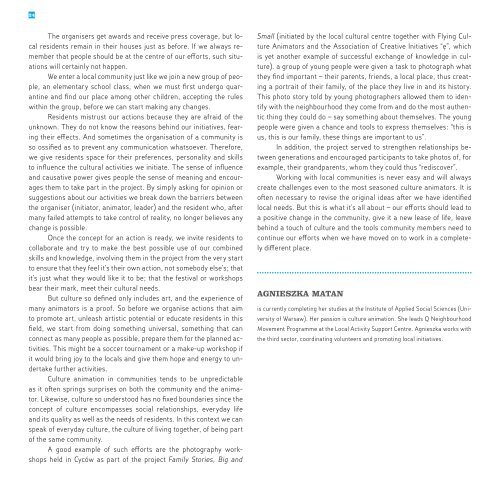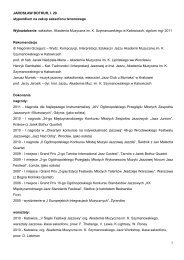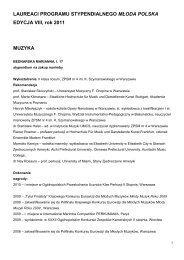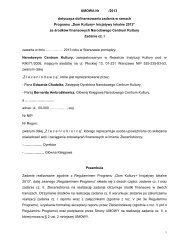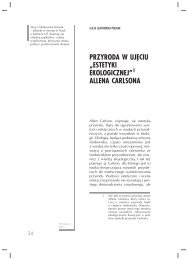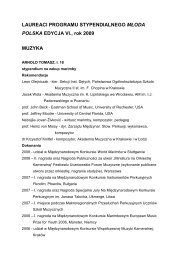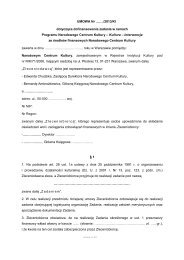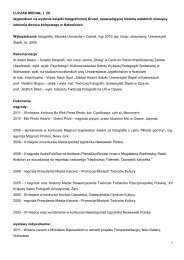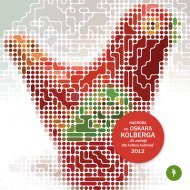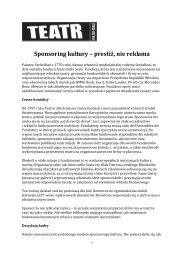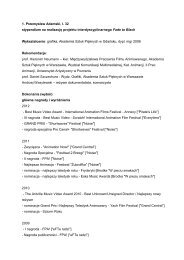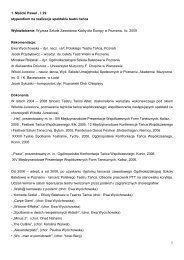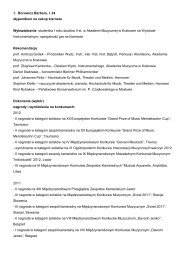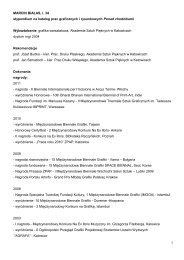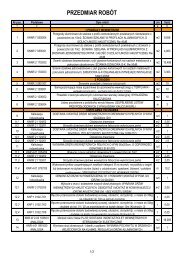Untitled - Narodowe Centrum Kultury
Untitled - Narodowe Centrum Kultury
Untitled - Narodowe Centrum Kultury
Create successful ePaper yourself
Turn your PDF publications into a flip-book with our unique Google optimized e-Paper software.
24<br />
The organisers get awards and receive press coverage, but local<br />
residents remain in their houses just as before. If we always remember<br />
that people should be at the centre of our efforts, such situations<br />
will certainly not happen.<br />
We enter a local community just like we join a new group of people,<br />
an elementary school class, when we must first undergo quarantine<br />
and find our place among other children, accepting the rules<br />
within the group, before we can start making any changes.<br />
Residents mistrust our actions because they are afraid of the<br />
unknown. They do not know the reasons behind our initiatives, fearing<br />
their effects. And sometimes the organisation of a community is<br />
so ossified as to prevent any communication whatsoever. Therefore,<br />
we give residents space for their preferences, personality and skills<br />
to influence the cultural activities we initiate. The sense of influence<br />
and causative power gives people the sense of meaning and encourages<br />
them to take part in the project. By simply asking for opinion or<br />
suggestions about our activities we break down the barriers between<br />
the organiser (initiator, animator, leader) and the resident who, after<br />
many failed attempts to take control of reality, no longer believes any<br />
change is possible.<br />
Once the concept for an action is ready, we invite residents to<br />
collaborate and try to make the best possible use of our combined<br />
skills and knowledge, involving them in the project from the very start<br />
to ensure that they feel it’s their own action, not somebody else’s; that<br />
it’s just what they would like it to be; that the festival or workshops<br />
bear their mark, meet their cultural needs.<br />
But culture so defined only includes art, and the experience of<br />
many animators is a proof. So before we organise actions that aim<br />
to promote art, unleash artistic potential or educate residents in this<br />
field, we start from doing something universal, something that can<br />
connect as many people as possible, prepare them for the planned activities.<br />
This might be a soccer tournament or a make-up workshop if<br />
it would bring joy to the locals and give them hope and energy to undertake<br />
further activities.<br />
Culture animation in communities tends to be unpredictable<br />
as it often springs surprises on both the community and the animator.<br />
Likewise, culture so understood has no fixed boundaries since the<br />
concept of culture encompasses social relationships, everyday life<br />
and its quality as well as the needs of residents. In this context we can<br />
speak of everyday culture, the culture of living together, of being part<br />
of the same community.<br />
A good example of such efforts are the photography workshops<br />
held in Cyców as part of the project Family Stories, Big and<br />
Small (initiated by the local cultural centre together with Flying Culture<br />
Animators and the Association of Creative Initiatives “ę”, which<br />
is yet another example of successful exchange of knowledge in culture).<br />
a group of young people were given a task to photograph what<br />
they find important – their parents, friends, a local place, thus creating<br />
a portrait of their family, of the place they live in and its history.<br />
This photo story told by young photographers allowed them to identify<br />
with the neighbourhood they come from and do the most authentic<br />
thing they could do – say something about themselves. The young<br />
people were given a chance and tools to express themselves: “this is<br />
us, this is our family, these things are important to us”.<br />
In addition, the project served to strengthen relationships between<br />
generations and encouraged participants to take photos of, for<br />
example, their grandparents, whom they could thus “rediscover”.<br />
Working with local communities is never easy and will always<br />
create challenges even to the most seasoned culture animators. It is<br />
often necessary to revise the original ideas after we have identified<br />
local needs. But this is what it’s all about – our efforts should lead to<br />
a positive change in the community, give it a new lease of life, leave<br />
behind a touch of culture and the tools community members need to<br />
continue our efforts when we have moved on to work in a completely<br />
different place.<br />
agnieszka matan<br />
is currently completing her studies at the Institute of Applied Social Sciences (University<br />
of Warsaw). Her passion is culture animation. She leads Q Neighbourhood<br />
Movement Programme at the Local Activity Support Centre. Agnieszka works with<br />
the third sector, coordinating volunteers and promoting local initiatives.


